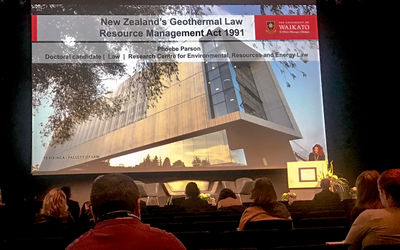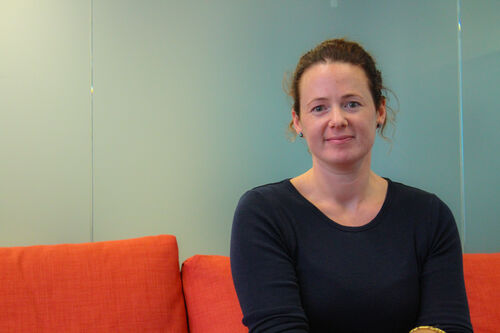An Interview with Phoebe Parson, a Visiting Scholar from University of Waikato, New Zealand
Phoebe Parson talks about her first impression of Iceland and her experience presenting at the 2018 IGC
REYKJAVIK, May 9 - At ISE, we welcome visiting scholars and fellows from other universities and believe that such visit enriches the individual and the community's academic endeavours, as well as further collaboration between both institutions. Two weeks ago, we had the pleasure to host Phoebe Parson, a PhD candidate at the University of Waikato, New Zealand, who flew across the world to visit Iceland. The purpose of her visit was to ultimately present as a speaker on the 2018 Iceland Geothermal Conference (IGC) , held on 24-27 April at Harpa Conference Centre in Reykjavik, Iceland. The international conference brought together industry leaders, scientists and policy makers, and was fully packed with in-depth discussions regarding the current geothermal advances and barriers that hinder the development of geothermal sector around the world.

Phoebe's talk during the 2018 IGC was titled “New Zealand's Geothermal Law: Resource Management Act 1991”. In her presentation, she discussed the legal status of geothermal resources, specifically in New Zealand, and sustainable resource management. Phoebe then talked about the regional policy and regulations. According to Phoebe, environmental resources are classified based on the system's characteristics and purposes. They are classified to “development”, in which large-scale sustainable usage would be allowed, “limited development”, in which smaller usage that would not disturb surface features are allowed, “research”, in which only small usage and those undertaken for scientific research are allowed, and “protected”, in which it contains vulnerable geothermal features and no exploitation are to be undertaken. Based on these categories, different management strategy should be adopted. Last but not least, she discussed the importance and implication of public participation in decision-making that concerns the environment and its resources.
During her stay, we had the wonderful opportunity to interview Phoebe. As one of the speakers at the IGC, we wanted to know her opinion regarding the event:
There were two important things that the event achieved. One is that the networking opportunities that allow participants to learn and promote their research or project. Another one is the gear-and-pulley effect. When we have more people contributing into something, it is like we contribute momentum to the system; the whole network starts to move at a larger scale. At the event, the geothermal community came together to contribute momentum around the geothermal resource development and how it would help achieve the larger, renewable energy and climate change goals.
 Back in New Zealand, Phoebe's research interest lies in the
law and regulation for geothermal resources, including comparative
international law. Her research explores the policy and regulatory processes
for geothermal resource development in New Zealand and is supported by the
Waikato Regional Council and the International Bar Association's Section on
Energy, Environmental, Natural Resources and Infrastructure Law, under the
supervision of Dr. Barry Barton at the Faculty's Research Centre for
Environmental, Resources and Energy Law. When asked about her first
impression of Iceland, she expressed:
Back in New Zealand, Phoebe's research interest lies in the
law and regulation for geothermal resources, including comparative
international law. Her research explores the policy and regulatory processes
for geothermal resource development in New Zealand and is supported by the
Waikato Regional Council and the International Bar Association's Section on
Energy, Environmental, Natural Resources and Infrastructure Law, under the
supervision of Dr. Barry Barton at the Faculty's Research Centre for
Environmental, Resources and Energy Law. When asked about her first
impression of Iceland, she expressed:
Iceland is a rugged and wild country, and I really loved it. It is intimidating, but challenging at the same time. This place resonates with me, since parts of New Zealand are wild too. As for the people, all Icelanders I have spoken to have been pleasant and yet, present.
Towards the end of the interview, we then asked Phoebe for her advice or suggestions to students looking to pursue a postgraduate education. Her reply was simple, but applicable:
Use your initiative and ask questions about the things that interest you! For anyone who are looking to pursue a research in law, talk to people who are involved the policy and law practice that you are interested in.
